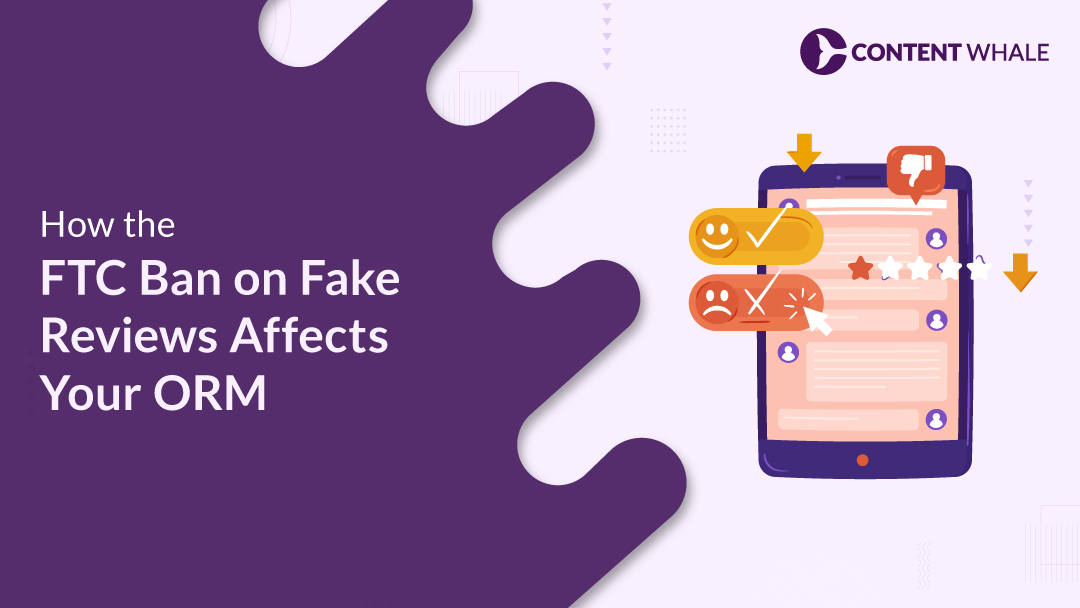The Federal Trade Commission (FTC) has recently enacted a significant ban on fake reviews, a move that carries substantial implications for businesses across industries.
This regulation is designed to enhance transparency and protect consumers from deceptive practices that can erode trust in online platforms.
As fake reviews have long been a tool for manipulating public perception, this ban marks a pivotal shift in how businesses must manage their online reputation.
The purpose of this blog is to delve into the impact of the FTC’s ban on fake reviews on online reputation management (ORM) and provide insights on how businesses can adapt to these new guidelines while maintaining consumer trust and brand integrity.
Understanding the FTC’s Ban on Fake Reviews
The Federal Trade Commission (FTC) has introduced a new rule to address the widespread issue of fake reviews. Finalized in August 2024, this regulation is a significant step toward enhancing consumer protection and ensuring transparency in online reviews.
Key Provisions:
- Ban on Fake Reviews: The rule prohibits the creation, sale, or distribution of fake reviews, including those generated by artificial intelligence (AI). This targets deceptive practices that manipulate consumer perception.
- Prohibition of Incentivized Reviews: Businesses are now barred from offering incentives for reviews that express a particular sentiment, ensuring reviews reflect genuine consumer experiences.
- Penalties for Violations: Companies violating these regulations face fines up to $51,744 per violation, serving as a deterrent against dishonest practices.
Importance of Compliance
The FTC’s stricter guidelines address concerns over deceptive practices that erode consumer trust. Adhering to these rules is essential for maintaining a positive online reputation and avoiding legal repercussions.
The Role of Authentic Reviews in ORM

Authentic reviews are essential for effective Online Reputation Management (ORM), as they foster the trust that is crucial for consumer decision-making. When potential customers see genuine feedback from others, it builds a sense of reliability and transparency around your brand, which is key to maintaining a positive online reputation.
Conversely, fake reviews can severely damage consumer trust. In fact, 97% of consumers report losing trust in a brand when they discover fake reviews. This erosion of trust can lead to lasting reputational damage, making it difficult for businesses to regain consumer confidence and driving customers to competitors who are perceived as more trustworthy.
Encouraging authentic reviews goes beyond complying with FTC guidelines; it also strengthens long-term customer relationships. Authentic reviews offer valuable insights that help businesses improve their products and services, leading to higher customer satisfaction and loyalty.
In today’s competitive digital landscape, focusing on authentic reviews is vital for sustaining consumer trust, protecting your brand’s reputation, and driving growth through strong customer connections.
How the Ban Affects Digital Marketing Strategies
The FTC’s ban on fake reviews necessitates a significant shift in digital marketing strategies, particularly in online reputation management.
1. Emphasis on Authenticity and Transparency
- Genuine Reviews Only: Businesses must ensure that all reviews are authentic, avoiding the use of fake, AI-generated, or incentivized reviews. Transparency in review solicitation is now mandatory, requiring clear disclosure of any connections between reviewers and the business.
2. Increased Vigilance in Review Management
- Regular Audits and Monitoring: Companies need to audit and monitor reviews regularly to comply with FTC guidelines, swiftly removing any that are non-compliant.
3. Updating Review Solicitation Practices
- Employee Education and Revised Incentives: Educating employees on FTC regulations and revising incentive programs to avoid biased reviews are crucial steps in adapting to the new rules.
By prioritizing authenticity and transparency, businesses can comply with FTC regulations, protect their reputation, and build stronger customer relationships.
Best Practices for Ensuring Compliance with the FTC’s Ban on Fake Reviews

To comply with the FTC’s ban on fake reviews, businesses must adopt key practices to ensure their online reputation management (ORM) strategies align with the new regulations.
- Conduct Regular Audits: Regularly review and remove non-compliant reviews across all platforms to meet FTC standards.
- Promote Authentic Feedback: Encourage genuine customer reviews without offering incentives that could bias their feedback. Authenticity is crucial for building trust.
- Educate Employees and Partners: Ensure all involved in review management understand the FTC’s rules, including the importance of disclosing any material connections between reviewers and the business.
- Update Review Policies: Clearly outline acceptable practices in your review policies, emphasizing transparency and compliance with FTC guidelines.
- Implement Monitoring: Set up real-time alerts to monitor reviews continuously, ensuring prompt identification and correction of any issues.
These practices help maintain compliance, protect your brand’s reputation, and foster consumer trust.
Preparing for Potential ORM Challenges After the FTC Ban on Fake Reviews
The FTC’s ban on fake reviews presents significant challenges for online reputation management (ORM). To navigate these challenges, businesses should focus on key strategies:
- Enhanced Monitoring: Implement real-time monitoring systems to detect and address non-compliant reviews quickly. Regular audits ensure all reviews align with FTC guidelines.
- Engage with Negative Reviews: Instead of suppressing negative feedback, address it constructively. This approach demonstrates transparency and commitment to customer satisfaction, which can mitigate the impact of negative reviews.
- Adapt Review Solicitation: Ensure that review requests emphasize honest feedback without tying incentives to positive reviews. Disclose any material connections between reviewers and the business to maintain transparency.
- Update ORM Policies: Revise ORM strategies to comply with FTC rules. Educate employees and partners on these updates to avoid violations.
These practices help maintain compliance and protect your brand’s reputation while fostering consumer trust.
Leveraging Authentic Reviews for Brand Growth

With the FTC’s ban on fake reviews, focusing on authentic reviews is vital for brand growth.
- Build Trust: Authentic reviews foster transparency, crucial for consumer trust. Highlighting genuine customer experiences strengthens your brand’s credibility and encourages potential customers to engage.
- Promote Honest Feedback: Encourage customers to provide honest feedback without pressuring them for positive reviews. This strategy not only complies with FTC regulations but also enhances the trustworthiness of your brand.
- Use Verified Testimonials: Incorporate real customer testimonials into your marketing to provide social proof. Genuine stories from satisfied customers can significantly influence new customers’ purchasing decisions.
- Leverage Social Proof: Ensure all social media engagement, like likes and shares, are authentic. This boosts your brand’s credibility and helps build a loyal customer base.
By prioritizing authentic reviews, businesses can comply with FTC rules, enhance their reputation, and drive sustainable brand growth.
Conclusion

The FTC’s ban on fake reviews represents a pivotal shift in digital marketing, emphasizing the need for authenticity and transparency in online reputation management (ORM).
Businesses must now focus on genuine customer feedback and align their strategies with these new regulations to maintain consumer trust and avoid hefty penalties.
This ruling not only protects consumers but also levels the playing field for honest businesses.
By eliminating fake reviews and promoting authentic interactions, companies can enhance their brand reputation and build stronger, trust-based relationships with their customers.
In this new era of digital marketing, success will come to those who prioritize ethical practices and deliver real value to their audience.
1. What does the FTC’s ban on fake reviews mean for my business?
The FTC’s new rule prohibits the creation, sale, or dissemination of fake reviews, including those generated by AI or those written by individuals without genuine experience with the product or service. This rule applies equally to both positive and negative reviews. Violations can result in hefty fines of up to $51,744 per infraction. Businesses must now focus on ensuring that all reviews associated with their products or services are authentic and transparently presented.
2. How can I ensure my business complies with the FTC’s review guidelines?
To comply, businesses should conduct regular audits of their reviews, removing any that do not meet the FTC’s authenticity standards. Additionally, it’s crucial to disclose any material connections between the reviewer and the business, such as reviews from employees or family members. Avoid incentivizing reviews in a way that pressures customers to provide positive feedback.
3. Why are authentic reviews important for online reputation management?
Authentic reviews are the cornerstone of trust between a business and its customers. With the FTC’s crackdown on fake reviews, businesses that rely on genuine customer feedback are more likely to build and maintain consumer trust, which is vital for long-term success. Fake reviews can not only lead to legal repercussions but also damage a brand’s credibility, driving potential customers away.
4. What are the risks of using fake reviews?
The risks include severe legal penalties, including fines that can reach over $50,000 per violation, as well as the loss of consumer trust and damage to your brand’s reputation. The FTC’s enforcement capabilities have been strengthened, meaning businesses that continue to engage in these practices are likely to face significant consequences.
5. How can I encourage more genuine customer reviews?
Encourage customers to leave honest reviews by simplifying the review process and asking for feedback without attaching any conditions or incentives that could bias their responses. Make it clear that you value their genuine opinions, which helps in collecting more authentic reviews that comply with FTC guidelines and strengthen your online reputation.





